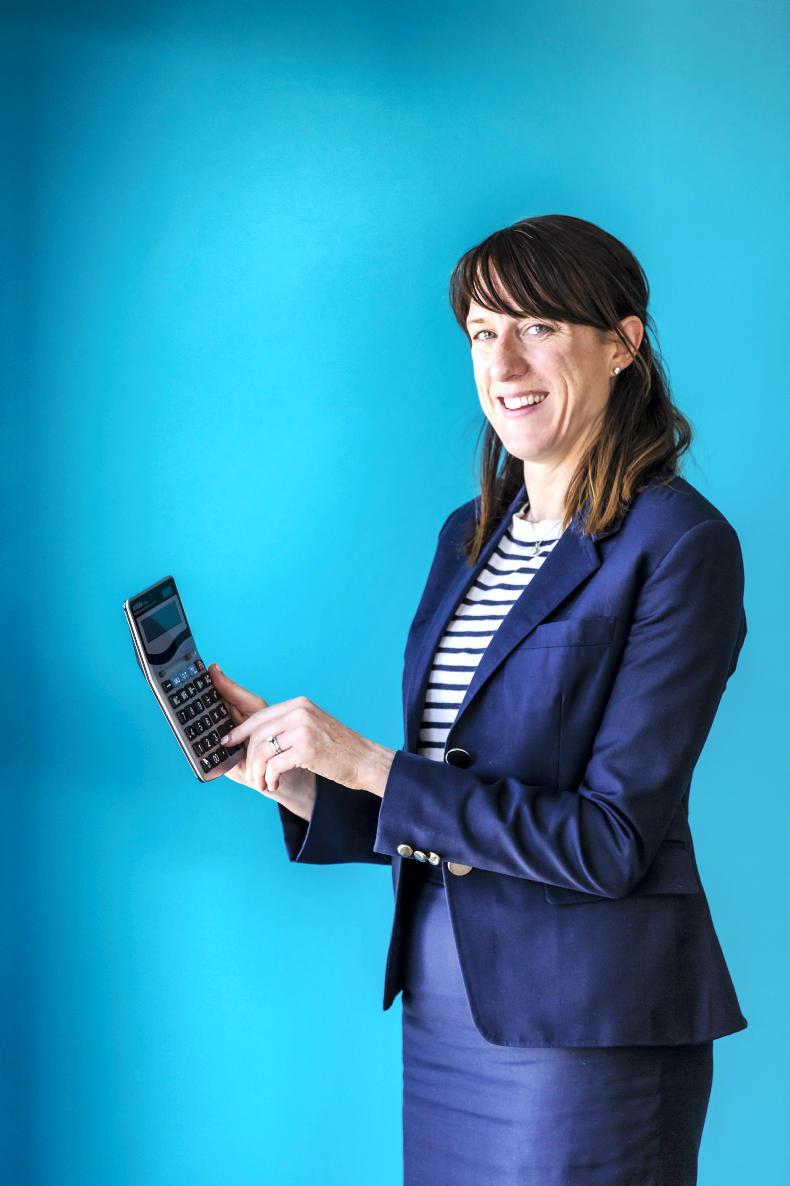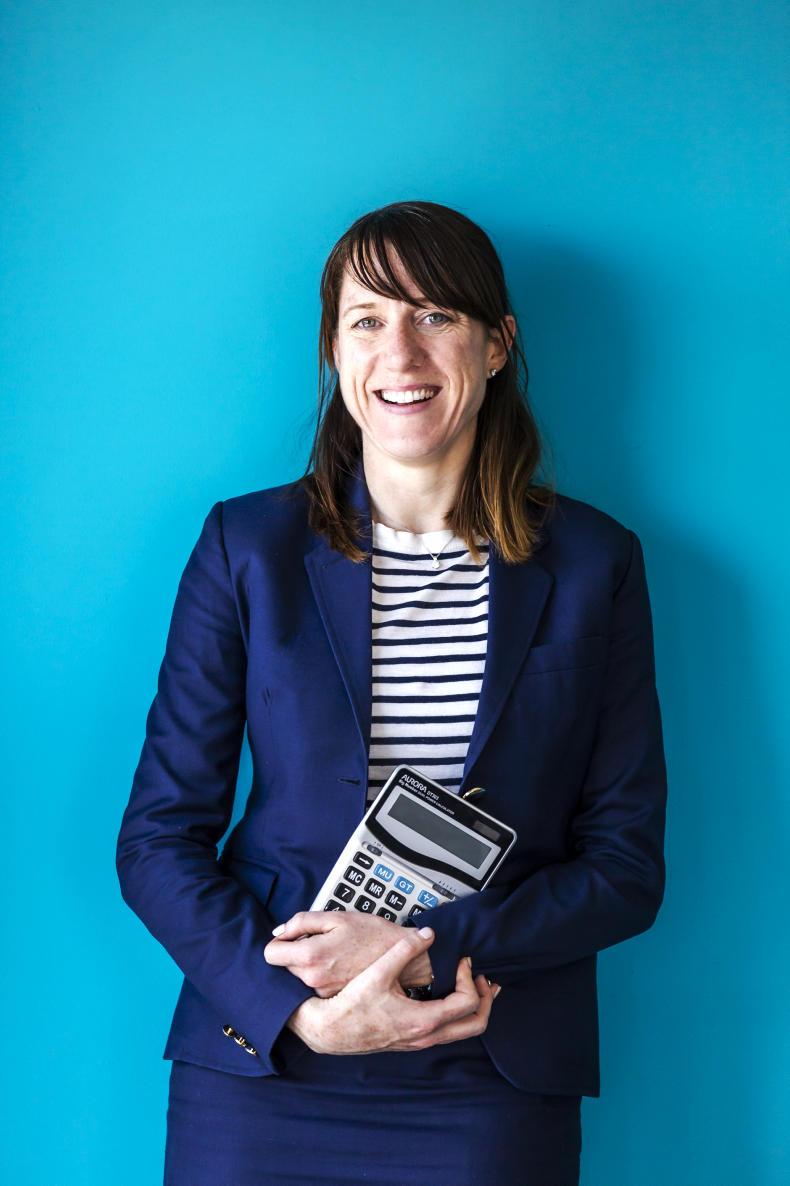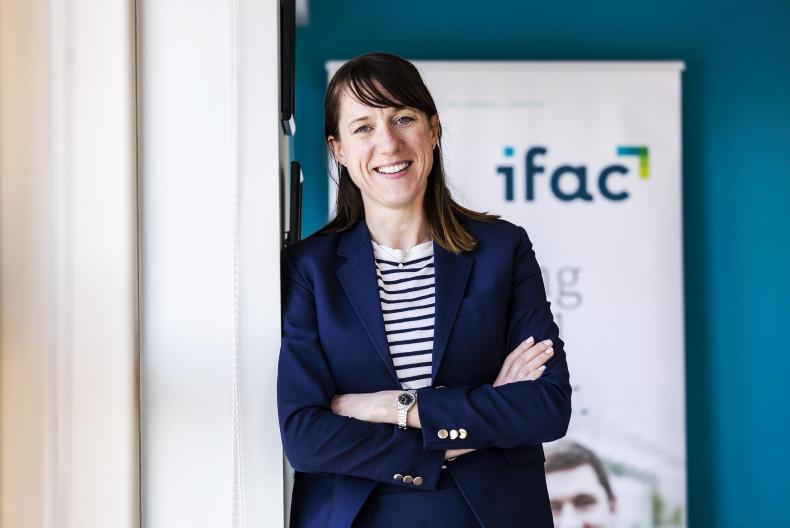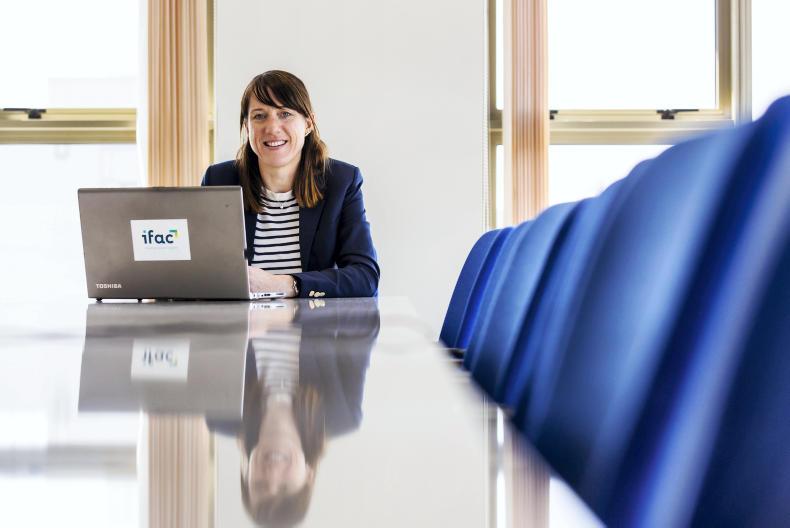Growing up Margaret says she was never a person who said she was going to be a doctor or accountant.
“Right up to the Leaving Cert I didn’t know what I wanted to do. I knew I wanted to go towards maths or business.”
She didn’t do transition year as she didn’t see any benefit of it to her.

So as a result Margaret was quite young doing the Leaving Cert and while she got a place in college she deferred her start date and instead went straight into the working world.
“I applied to Ulster Bank, I got it and worked in that role for three years. Looking back, that was the best thing I ever did.”
This new job was based in Ballyconnell in Co Cavan. However, she didn’t drive so Margaret had to be dropped up from her home in Longford on a Sunday night and collected on a Friday evening, until she learned to drive after about a year of having to depend on others for this.
“It was the only bank in town, which had a number of companies so it was very busy.”
Back to education
At 21 years of age, after three years in the bank, Margaret decided she had more to give. She went off to study agribusiness at Mountbellew and the Galway-Mayo Institute of Technology.
“I realised I really liked the accountancy side of it, which I never did for my Leaving Cert. 
That was a two-year certificate course. I went on to do a three-year accounting degree, I applied to all the ITs in the country that offered it. In the end I chose Waterford IT. I got to skip first year because my results were good enough. The management accounting module was a bit of step up so I had to work hard at that. My sister was also down there studying visual art.”
Margaret worked part time while she was studying and got a first-class honours degree. She didn’t work in her final year.
“My father thought I was mad giving up a good pensionable job in the bank. But our parents paid the rent for my sister and I, we paid our other bills as we worked part time in Waterford.”
Going into a third-level course with experience in the working world is something Margaret felt stood to her.
“I can’t emphasise enough how important the experience was; even small things like letter writing and filing skills were so valuable. I clicked with my manager who I learnt so much from.”
In the end, she never took up the place in college that she had been offered when she finished the Leaving Cert.
Job hunt
When she finished in Waterford, Margaret “did the milk round” applying for trainee accounting posts everywhere. She applied to RBK in Athlone, they took on circa 15 trainees every year but only two in the area of tax.
“They took on a good number of trainees in 2006, at the height of the boom,” said Margaret. “I got an interview for audit and accounting. They took from the interview that I had a real interest in tax. They called be back for a second interview and offered me the three-and-a-half-year programme. I did my chartered accounting exams there, which they paid for. You don’t get paid massively yourself as a trainee but they pay all your exam fees and give you study leave.”
A lot of our graduates here at ifac are doing ACCA
Margaret did her exams with the Institute of Chartered Accountants. The other option is the Association of Chartered Certified Accountants (ACCA). Having asked around beforehand about which one she should do, Margaret realised that everyone recommends the course they did themselves.
“A lot of our graduates here at ifac are doing ACCA,” she says.
Margaret spent the two years she was studying going into Athlone for classes on Tuesdays, Thursdays and Saturdays.
“The training contract went for the three and a half years. I got through my final exams by September 2008, I had another full year and a bit to go on my contract. So I decided to do the tax exams. As a chartered accountant you get exempt from part one. I decided myself to do all eight exams in the one year in 2009. I had to go right into the middle of Dublin for the lectures on a Saturday and Sunday nearly every weekend. Thankfully it worked out and I passed. By the time I came to negotiating my contract I had them all done.”
Tough times
Margaret qualified in tax at a tough time in the Irish economy and at the time accepted a further one-year contract once her training contract had finished.
“When my first 12-month contract was up they came back and offered me another one. But I wanted certainty, I was looking to buy a house. So they gave me permanency and I was promoted to supervisor. About a year later, I was promoted to manager and remained there for another two years approximately.”
At that point, the job at ifac was advertised. Margaret said she hadn’t been looking for a job but that it looked like a good opportunity. Her only fear was that she would have to work in Dublin.
“The job looked great but I had spent so long staying out of Dublin. I’m not a city person, never have been. I applied and was called back for a second interview. I didn’t think they could base me elsewhere, I thought I would be in the tax department in Bluebell.”
To her delight, the role was one that involved travel and Margaret can base herself out of the ifac office in Roscommon.

“I go to other offices and take care of the tax consultancy side of things. There’s four consultants around the country. There’s me and three men. I’m the only one up this side of the country. I look after Donegal, Mayo, Cavan, Monaghan and the north midlands.”
However, she is not limited to that area and if something comes up specifically on VAT it is usually sent in Margaret’s direction.
“It’s busy, I’m on the road about three days a week on average. Some clients I’ll meet in Dublin if it’s convenient for them. We could get clients coming in to us for a one-off, but have their own accountants. We have our team meetings in Dublin, normally once a month.”
Gender imbalance
While she is one of a few women in ifac, Margaret said that is not necessarily the norm when it comes to accountancy firms.
“In RBK it seemed like there were no men in the tax department for a while, it was all women; both tax partners were women as were the tax directors and managers when I was training. Then I came to IFAC and it was the exact opposite. I think it’s coming on from a tradition of sorts in the agri sector.”
Margaret said she learned to have a thick skin growing up, and that in the sector she is in it’s more about a new face than the gender of the face. When she started in ifac for example, her boss would go with her when she was meeting new clients for the first time, which is more about endorsing her as a business person than it is about gender.
Exams take over and they do consume you. I did a diploma myself lately and it consumed my life for a year. It reminded me that you have to be so disciplined to do well
For those thinking of working in tax and accounting, Margaret says: “It’s not a career for the faint hearted. It’s tough enough to work in and is stressful at times. To get there you’ve got to put your head down and forget about life for your training contract.
“Exams take over and they do consume you. I did a diploma myself lately and it consumed my life for a year. It reminded me that you have to be so disciplined to do well. Tax is really good, rewarding. I’m learning every day and the day I don’t learn something new is a disappointment almost.”
Margaret says she always followed what she liked and looked at her options. She says she’s lucky that the firms she has worked for have always paid for any education she has done. In ifac she says they do 50 hours of continuous professional development (CPD) training every year – 20 of those must be structured training/development courses.
“Tax changes day by day, legislation changes, interpretation changes depending on cases that have gone on, the budget etc. Keeping up to date is not only valuable, it’s essential. You cannot do what I do without staying focused and keeping up on what is going on out there.”
Growing up Margaret says she was never a person who said she was going to be a doctor or accountant.
“Right up to the Leaving Cert I didn’t know what I wanted to do. I knew I wanted to go towards maths or business.”
She didn’t do transition year as she didn’t see any benefit of it to her.

So as a result Margaret was quite young doing the Leaving Cert and while she got a place in college she deferred her start date and instead went straight into the working world.
“I applied to Ulster Bank, I got it and worked in that role for three years. Looking back, that was the best thing I ever did.”
This new job was based in Ballyconnell in Co Cavan. However, she didn’t drive so Margaret had to be dropped up from her home in Longford on a Sunday night and collected on a Friday evening, until she learned to drive after about a year of having to depend on others for this.
“It was the only bank in town, which had a number of companies so it was very busy.”
Back to education
At 21 years of age, after three years in the bank, Margaret decided she had more to give. She went off to study agribusiness at Mountbellew and the Galway-Mayo Institute of Technology.
“I realised I really liked the accountancy side of it, which I never did for my Leaving Cert. 
That was a two-year certificate course. I went on to do a three-year accounting degree, I applied to all the ITs in the country that offered it. In the end I chose Waterford IT. I got to skip first year because my results were good enough. The management accounting module was a bit of step up so I had to work hard at that. My sister was also down there studying visual art.”
Margaret worked part time while she was studying and got a first-class honours degree. She didn’t work in her final year.
“My father thought I was mad giving up a good pensionable job in the bank. But our parents paid the rent for my sister and I, we paid our other bills as we worked part time in Waterford.”
Going into a third-level course with experience in the working world is something Margaret felt stood to her.
“I can’t emphasise enough how important the experience was; even small things like letter writing and filing skills were so valuable. I clicked with my manager who I learnt so much from.”
In the end, she never took up the place in college that she had been offered when she finished the Leaving Cert.
Job hunt
When she finished in Waterford, Margaret “did the milk round” applying for trainee accounting posts everywhere. She applied to RBK in Athlone, they took on circa 15 trainees every year but only two in the area of tax.
“They took on a good number of trainees in 2006, at the height of the boom,” said Margaret. “I got an interview for audit and accounting. They took from the interview that I had a real interest in tax. They called be back for a second interview and offered me the three-and-a-half-year programme. I did my chartered accounting exams there, which they paid for. You don’t get paid massively yourself as a trainee but they pay all your exam fees and give you study leave.”
A lot of our graduates here at ifac are doing ACCA
Margaret did her exams with the Institute of Chartered Accountants. The other option is the Association of Chartered Certified Accountants (ACCA). Having asked around beforehand about which one she should do, Margaret realised that everyone recommends the course they did themselves.
“A lot of our graduates here at ifac are doing ACCA,” she says.
Margaret spent the two years she was studying going into Athlone for classes on Tuesdays, Thursdays and Saturdays.
“The training contract went for the three and a half years. I got through my final exams by September 2008, I had another full year and a bit to go on my contract. So I decided to do the tax exams. As a chartered accountant you get exempt from part one. I decided myself to do all eight exams in the one year in 2009. I had to go right into the middle of Dublin for the lectures on a Saturday and Sunday nearly every weekend. Thankfully it worked out and I passed. By the time I came to negotiating my contract I had them all done.”
Tough times
Margaret qualified in tax at a tough time in the Irish economy and at the time accepted a further one-year contract once her training contract had finished.
“When my first 12-month contract was up they came back and offered me another one. But I wanted certainty, I was looking to buy a house. So they gave me permanency and I was promoted to supervisor. About a year later, I was promoted to manager and remained there for another two years approximately.”
At that point, the job at ifac was advertised. Margaret said she hadn’t been looking for a job but that it looked like a good opportunity. Her only fear was that she would have to work in Dublin.
“The job looked great but I had spent so long staying out of Dublin. I’m not a city person, never have been. I applied and was called back for a second interview. I didn’t think they could base me elsewhere, I thought I would be in the tax department in Bluebell.”
To her delight, the role was one that involved travel and Margaret can base herself out of the ifac office in Roscommon.

“I go to other offices and take care of the tax consultancy side of things. There’s four consultants around the country. There’s me and three men. I’m the only one up this side of the country. I look after Donegal, Mayo, Cavan, Monaghan and the north midlands.”
However, she is not limited to that area and if something comes up specifically on VAT it is usually sent in Margaret’s direction.
“It’s busy, I’m on the road about three days a week on average. Some clients I’ll meet in Dublin if it’s convenient for them. We could get clients coming in to us for a one-off, but have their own accountants. We have our team meetings in Dublin, normally once a month.”
Gender imbalance
While she is one of a few women in ifac, Margaret said that is not necessarily the norm when it comes to accountancy firms.
“In RBK it seemed like there were no men in the tax department for a while, it was all women; both tax partners were women as were the tax directors and managers when I was training. Then I came to IFAC and it was the exact opposite. I think it’s coming on from a tradition of sorts in the agri sector.”
Margaret said she learned to have a thick skin growing up, and that in the sector she is in it’s more about a new face than the gender of the face. When she started in ifac for example, her boss would go with her when she was meeting new clients for the first time, which is more about endorsing her as a business person than it is about gender.
Exams take over and they do consume you. I did a diploma myself lately and it consumed my life for a year. It reminded me that you have to be so disciplined to do well
For those thinking of working in tax and accounting, Margaret says: “It’s not a career for the faint hearted. It’s tough enough to work in and is stressful at times. To get there you’ve got to put your head down and forget about life for your training contract.
“Exams take over and they do consume you. I did a diploma myself lately and it consumed my life for a year. It reminded me that you have to be so disciplined to do well. Tax is really good, rewarding. I’m learning every day and the day I don’t learn something new is a disappointment almost.”
Margaret says she always followed what she liked and looked at her options. She says she’s lucky that the firms she has worked for have always paid for any education she has done. In ifac she says they do 50 hours of continuous professional development (CPD) training every year – 20 of those must be structured training/development courses.
“Tax changes day by day, legislation changes, interpretation changes depending on cases that have gone on, the budget etc. Keeping up to date is not only valuable, it’s essential. You cannot do what I do without staying focused and keeping up on what is going on out there.”












SHARING OPTIONS